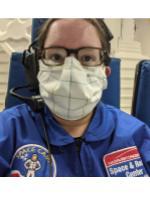Embedding Computational Thinking skills in Literacy Instruction K-2
,
Colorado Convention Center, Bluebird Ballroom Lobby, Table 31
Presenters


Session description
Purpose & objective
The purpose of my presentation is to address the educational challenge of time constraints in teaching while enhancing student learning through interdisciplinary approaches. I aim to empower educators with the following participant outcomes:
Interdisciplinary Integration: Participants will understand the value of integrating subject matter to optimize teaching time and improve student engagement.
Computational Thinking Skills: Educators will learn how to infuse computational thinking principles (sequencing, decomposition, algorithmic thinking, abstraction) into literacy instruction.
Transdisciplinary Lesson Design: Participants will be able to create lesson plans that transcend traditional subject boundaries, promoting holistic learning.
Technology Integration: I will introduce specific technology interventions, including widely available tools like Scratch for coding and digital literacy resources for cross-curricular application.
Models Employed: We will explore models of interdisciplinary and transdisciplinary teaching, such as project-based learning and thematic units, to illustrate effective approaches.
Instructional Activities: Attendees will engage in hands-on activities, practicing the integration of computer science skills into literacy instruction through interactive exercises.
Evidence of Success: I will share examples and case studies demonstrating how this approach has positively impacted student learning outcomes and teacher satisfaction.
By the end of the presentation, participants will be equipped with the knowledge, skills, and practical resources to implement interdisciplinary teaching, infuse computational thinking into their literacy instruction, and overcome the challenge of time constraints in education.
Outline
Introduction-5 minutes
Outline objectives
Provide my background and purpose
Share links for participants
Identifying the need-5 minutes
Why integrate computational thinking and literacy?
Why might this be valuable to our students?
What is computational thinking?-5 minutes
4 main components
What it means to think computationally
Exploring with computational thinking-15 minutes
Explore provided activities
Identify computational thinking components
Evaluate effectiveness
Exploring with literacy integration-15 minutes
How can computational thinking fit with literacy skill development?
Where can computational thinking fit with literacy skill development?
Wrap-up and questions-5 minutes
Supporting research
Rawhiya Jacob, S., & Warschauer, M. (2018). Computational Thinking and Literacy. Journal of Computer Science Integration, 1(1), 1. https://escholarship.org/content/qt0d9886dx/qt0d9886dx_noSplash_45049df4ee3fcaf1f334507ba2af7733.pdf?t=re8ou2
Session specifications
Collaborator
- Partner with educators to identify digital learning content that is culturally relevant, developmentally appropriate and aligned to content standards.
Facilitator
- Foster a culture where students take ownership of their learning goals and outcomes in both independent and group settings.
Computational Thinker
- Students formulate problem definitions suited for technology-assisted methods such as data analysis, abstract models and algorithmic thinking in exploring and finding solutions.
 Return
Return Participate and share: Poster
Participate and share: Poster  Trips and Tours
Trips and Tours